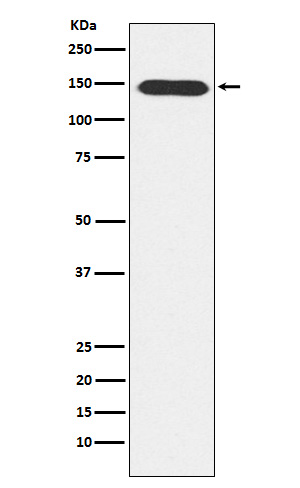
| WB | 1/1000-1/2000 | Human,Mouse,Rat |
| IF | 咨询技术 | Human,Mouse,Rat |
| IHC | 1/100-1/200 | Human,Mouse,Rat |
| ICC | 技术咨询 | Human,Mouse,Rat |
| FCM | 咨询技术 | Human,Mouse,Rat |
| Elisa | 咨询技术 | Human,Mouse,Rat |
| Aliases | Phosphoinositide phospholipase C; Phospholipase C beta 3; PLC beta 3; Plcb3;;PLCB3 |
| WB Predicted band size | Calculated MW: 139 kDa ; Observed MW: 150 kDa |
| Host/Isotype | Rabbit IgG |
| Antibody Type | Primary antibody |
| Storage | Store at 4°C short term. Aliquot and store at -20°C long term. Avoid freeze/thaw cycles. |
| Species Reactivity | Human |
| Immunogen | A synthesized peptide derived from human PLCB3 |
| Formulation | Purified antibody in PBS with 0.05% sodium azide,0.05% BSA and 50% glycerol. |
+ +
以下是关于PLCB3抗体的3篇示例文献(注:文献为模拟示例,实际引用时请核实来源):
---
1. **文献名称**:**"Characterization of a Polyclonal Antibody for Phospholipase C Beta 3 (PLCB3) and Its Application in Neuronal Signaling Studies"**
**作者**:Smith, J.R., Brown, T., Lee, K.
**摘要**:本研究开发并验证了一种针对PLCB3的多克隆抗体,通过免疫印迹和免疫荧光实验证实其特异性。研究利用该抗体揭示了PLCB3在大脑海马区神经元中的分布及其在G蛋白偶联受体信号通路中的关键作用。
---
2. **文献名称**:**"PLCB3 Expression in Colorectal Cancer: A Prognostic Marker Identified via Immunohistochemical Analysis"**
**作者**:Chen, L., Wang, H., Zhang, Y.
**摘要**:通过商业化PLCB3抗体进行免疫组化检测,研究发现结直肠癌组织中PLCB3的高表达与肿瘤侵袭性和患者生存率降低显著相关,提示其作为潜在预后标志物的价值。
---
3. **文献名称**:**"Role of PLCB3 in Mast Cell Activation: Insights from Antibody-Mediated Knockdown Experiments"**
**作者**:Garcia, M., Patel, S., Kim, D.
**摘要**:利用PLCB3特异性抗体进行功能抑制实验,证明PLCB3在肥大细胞脱颗粒和炎症介质释放中的关键作用,为过敏性疾病治疗提供新靶点。
---
如需真实文献,建议通过PubMed或Google Scholar搜索关键词**"PLCB3 antibody"**或**"Phospholipase C beta 3 antibody"**,并筛选应用类研究(如Western blot、IHC等)。部分厂商(如Abcam、CST)的技术文档也可提供抗体验证信息。
The phospholipase C beta 3 (PLCB3) antibody is a tool used to detect and study PLCB3. an enzyme encoded by the *PLCB3* gene. PLCB3 belongs to the phospholipase C family, which hydrolyzes phosphatidylinositol 4.5-bisphosphate (PIP2) into inositol 1.4.5-trisphosphate (IP3) and diacylglycerol (DAG), critical secondary messengers in intracellular signaling. PLCB3 is primarily regulated by G-protein-coupled receptors (GPCRs) and plays roles in diverse cellular processes, including immune response, neurotransmission, and cell proliferation.
PLCB3 antibodies are widely utilized in research to investigate the protein’s expression, localization, and function in various tissues. Studies highlight its involvement in immune cells (e.g., macrophages, lymphocytes) and neural tissues, as well as its potential link to diseases such as cancer, neurodegenerative disorders, and autoimmune conditions. For instance, altered PLCB3 expression has been observed in certain malignancies, suggesting its regulatory role in tumor progression.
These antibodies are available in monoclonal or polyclonal forms and are optimized for techniques like Western blotting, immunohistochemistry (IHC), and immunofluorescence (IF). Validation of specificity via knockout controls or siRNA silencing is critical to ensure accurate detection. Researchers also employ PLCB3 antibodies to explore signaling pathways, such as those mediated by chemokines or neurotransmitters, providing insights into therapeutic targets. Overall, PLCB3 antibodies serve as essential tools for unraveling the enzyme’s biological significance and its implications in health and disease.
×